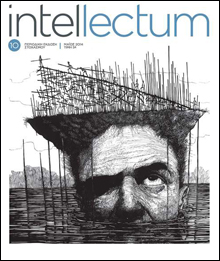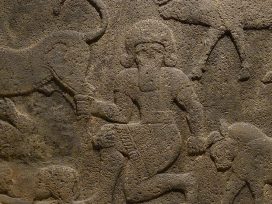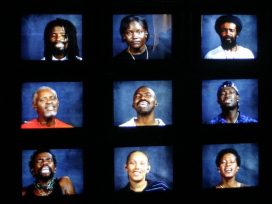Freedom is not a philosophy, nor is it even an idea. It is a movement of consciousness that leads us, at certain moments, to utter one of two monosyllables: Yes or No. In their brevity, lasting but an instant, like a flash of lightening, the contradictory character of human nature stands revealed.
Octavio Paz, The Other Voice: Essays on Modern Poetry
It was the great publishing surprise of the year, released – even more surprisingly – by a large and well-established publishing house (Livanis Publishing) that doesn’t usually publish books containing such content. Dimitris Koufontinas was a member of the notorious terrorist organization “17 November”, also known as 17N. His book entitled “Born on 17 November” caused a certain degree of awkwardness in Greece, the mere sight of its cover being enough to trigger protest. Men of letters hastened to criticize it and advised us not to read it, without the vast majority actually having read it themselves. After all, it is impossible to have read the book within a few minutes or even a few hours of its publication.
 The book’s sales (the first edition rapidly sold out) affirmed the interest and curiosity of a Greek audience who want to be informed not only of Koufontinas’ opinions but mainly of the new evidence concerning important violent events that marked modern Greek history from the post-dictatorship period that commenced in 1973 and lasted until 2002, when a significant number of 17N members were arrested.
The book’s sales (the first edition rapidly sold out) affirmed the interest and curiosity of a Greek audience who want to be informed not only of Koufontinas’ opinions but mainly of the new evidence concerning important violent events that marked modern Greek history from the post-dictatorship period that commenced in 1973 and lasted until 2002, when a significant number of 17N members were arrested.
Dimitris Koufontinas, 17N and the organization’s illegal, anti-authoritarian terrorist activity has preoccupied Greek public opinion and the secret services of numerous states for almost three decades. Now, the first book offering a view “from within” allows us to learn the version of events provided by the offender-author of the book, Dimitris Koufontinas.
The book includes information released for the first time concerning numerous issues, including: why Pavlos Bakoyannis, the liberal Greek politician and son-in-law of former prime minister of Greece Konstantinos Mitsotakis, was targeted; what exactly happened in Sepolia, a neighborhood of Athens where members of 17N clashed with the police; how the military weapons from Sikourio Military Base were stolen; and how much money informers received for their role in the episode on Louise Riencourt, a street in Athens, in which Greek police purportedly came close to catching a substantial number of 17N members.
This is a book that has implications for those who consider themselves intellectuals, not least given the extent of Dimitris Koufontinas’ engagement with the literature of revolutionary and political movements. In the last twelve years of his imprisonment, he translated several significant books. In fact, the first book he translated in prison was Mauricio Rosencof’s Memorias del calabozo or “Tupamaros: A prison diary” (Koukkida Publishing), which analyses the essence of human existence and the power of the human spirit in extremely inhuman conditions. Rosencof was a leader of the Tupamaros National Liberation Movement in Uruguay, and his book amounts to half a library in a sense, making The Count of Monte Cristo seem more like a tough fairytale for children. Koufontinas refers emphatically to the inspiration he gained from the Tupamaros in “Born on 17 November”, albeit in a way that glosses over significant differences between the Uruguayan movement and 17N.
Furthermore, “Born on 17 November” is particularly relevant in this grim era of economic policy dictated by various memorandums, as many of the author’s conclusions regarding Greece’s political, economic and social situation have been proven correct even if the overwhelming majority will certainly take issue both with the “means” used in 17N’s operations and the “results” obtained (certainly their actions did nothing to rescue the country).
What this book does not cover
“Born on 17 November” refers only briefly to the robberies that financed 17N. There is no evaluation, description or more in-depth analysis concerning the selection of targets apart from a few exceptions (such as that of the Hellenic Post store robbery in Vyronas, a suburb of Athens).
Indeed, the book does not refer to 17N as an organization at all. It portrays the solitary path taken by Dimitris Koufontinas himself, probably the most significant member of its second generation, without giving information about how group members interacted with each other or how the organization actually functioned. This kind of information is provided to some extent for the rival ELA (known in English as “Revolutionary Popular Struggle”) organization. However, 17N appears more as a huge projection screen on which a few, vaguely linked faces are sighted in passing – dominated of course by the face of Koufontinas himself.
Moreover, the book does not refer to crucial data brought to light in various ways, such as the information that 17N member Savvas Xeros was carrying the keys of all 17N hideouts when a makeshift bomb exploded in his hands near the Hellenic Register of Shipping in Summer 2002.
Neither does it refer to the crucial differences between Pepe Mujica, Raul Sendic, Mauricio Rosencof, Nato Fernández Huidobro and thousands of other Tupamaros who acted without disguise, that is, without using hoods, and the members of 17N who were few and acted secretly. In addition, it does not adequately cover the crucial fact that, in contrast to the Tupamaros who Dimitris Koufontinas identifies as genuinely rebellious idols, the majority of 17N members collaborated with the law enforcement authorities without having been tortured (with the exception of Savvas Xeros). For, if this means that these 17N members were not actually real rebels, then 17N cannot be regarded in any way as a rebellious organization but only as a terrorist-criminal one.
Introduction
This book claims a certain degree of moral integrity in that Dimitris Koufontinas assembles therein many unknown facets of modern Greek history. Added to which, there is an awareness that if somebody tries to write “objectively”, he will not please anyone.
After the publisher’s note, Jorge Sabalsa’s brief letter to the reader and Nikos Yiannopoylos’s interesting prologue, Koufontinas’s book begins at the end. Namely, with the bomb that exploded due to a German-made clock that short-circuited in the hands of 17N member Savvas Xeros on Saturday 29 June 2002 near the offices of the Hellenic Register of Shipping.
Political genesis and the first steps
Having begun at the end, the author returns to the beginning, to the time and place in which his own political genesis commenced: 17 November 1973, the day on which the military junta crushed the Athens Polytechnic uprising. He recalls that the poem, “The free besieged”, by Dionysios Solomos (1798-1857), also made a strong impression on him as a work characterized by the struggle of opposites, of the besieged and the free, of life and death, of love and sacrifice.
According to Koufontinas, the main characteristics of the uprising (which spelled the end of the Greek dictatorship) were the following:
1) It was a people’s movement with both peaceful and violent characteristics.
2) It maintained an impulsive and centrally unorganized character until the end.
3) It would have had a different outcome if a reliable political power coordinated and guided the uprising. But the leadership of the Left Party was absent, since the dynamics of the subversive events of that November had scared it off, transcended it and thrown it into disarray.
He experienced the rest of the post-dictatorship period, he writes, as a political adolescence. According to Koufontinas, beyond the “bald agents”, a secret group within the party of PASOK (one of Greece’s two dominant political parties) who acted against inter-party dissidents, he inevitably identified with party cadres who are not really interested in the development of political movements but only in increasing their political influence through them. At the same time, he wrote articles and became the publisher of the student newspaper Student Struggle of the Panhellenic Student Movement, which he claims to be the first newspaper published in modern Greek (monotonic orthography).
Not long thereafter he was arrested for the first time, at the end of 1975, after the demonstration in Omonoia (a neighbourhood in downtown Athens) that drew attention to the plight of those who stood to lose their homes in Perama (a suburb of Piraeus). The reason for this being government demolition plans that were to pave the way for the tanks of the oil multinationals. That night he understood the phrase “frozen to the core”. However, the homeless of Perama ultimately won the struggles in both the streets and in the courts.
The role of violence in the post-dictatorship era
Koufontinas claims that he remained circumspect about armed organizations. “It was in my character to abhor violence”, he notes.
However, when I pushed this thought to its extreme, so as only to admit the “peaceful” political act, I reached the conclusion that I was denying the idea of the revolution itself… Che, Fidel, Mao… And here in my land, I was denying the revolution of 1821 (the decisive Greek revolt against the Turks), the resistance of the ELAS (Greek People’s Liberation Army) and DSE (Democratic Army of Greece), of my own grandfather and father. I was even denying the event of my political birth in November 1973 and the powerful resistance to junta violence. So I was standing in front of a tragic contradiction. The Left is against violence by definition. However, it is obliged to use violence to create a society in which violence does not exist.
And in the spirit of the people’s spontaneous reaction I found something of November’s notion. And without surprise I discovered fury in me, a rage against those who used to savagely beat the people, indiscriminately, with brutality and sadism […] My anger did not decrease later, when I listened to the official political parties naming ‘agent provocateurs’ and ‘junta elements’ and ‘suspects’ who reacted even a little to national violence.”
On 23 December 1975, the CIA’s station chief in Greece was executed in Psychiko (a suburb of Athens). Koufontinas, however, was not there. The reason being that he did not yet belong to 17N. Given that, according to him, he became a member of 17N around 1981 (after the split with the ELA), he was probably the main link in 17N’s second generation. The main difference between the second and the first generation being that no one from the first was ever arrested by the law-enforcement authorities (with the probable exception of Alexandros Yotopoulos).
The year 1976 constitutes for Koufontinas the culmination of the post-dictatorship period and the people’s struggles: protest marches, demonstrations, the deaths of demonstrators (including the 67 year-old vendor Anastasia Tsivika), the enactment of the anti-labour 330 law (essentially enacted in order to prohibit labour unions), which minister of labour Laskaris introduced into parliament, people’s reactions in Kordelio (a municipality of the Thessaloniki urban area) against the pollution caused by US Ethyl, the military law in Mantoudi on Evia to “tackle” the struggles of miners and residents on the island, and mass reactions at the so-called “Bodosakis” sweatshops (involving companies such as and , among others).
The rift with the leftwing parties as the cause of Koufontinas’ preference for 17N
According to Koufontinas, his rift with the leftwing parties came with his realization that political parties distort the truth. He concludes that “agent provocateurs” are always behind “every popular movement that oversteps the limits of a constantly shrinking realm of legality”.
He reckons that at that time, “the official Left was adopting an apologetic-defensive outlook on history […] it was assuming the role of the victim”. In contrast to which, Koufontinas declares his desire for “the revolutionary essence of the Left”, “our action as a counterattack”.
At the same time, he describes how, “the employers united in one solid front”, in the form of the SEV (Hellenic Federation of Enterprises), and the newspapers started to ignore the strikes and “the dynamics of the autonomous class movement began to fade.” The idea of creating a factory union in which all the big unions would participate eventually proved ineffectual and Christos Kassimis (a founding member of the ELA) was shot dead by police outside the German company AEG.
“However, the personal choice to join the armed struggle, that huge leap from ‘fitting in’ to ‘being’, was yet to come” for Koufontinas. He notes that “it entailed overturning the whole of political and private life […] it meant entering another world with special rules”, where “imprisonment and death itself constituted a real possibility and you were under constant pressure that you could not share even with the people closest to you; all this had to be achieved, of course […] without altering your character, without denying your moral values.”
First steps in the illegal world
Sitting on a bench at the Community Centre near the Law School, Dimitris Koufontinas was renamed “Antonis”, the name of a hero in Mauthausen by Iakovos Kambanelis (1921-2011). The next day he read a declaration of the ELA’s basic positions and joins the organization. However, he never developed a friendly relationship with the first partner who introduced him to illegality. “It was one of my disappointments in the armed course of action. I had reckoned that partners, who want the same things, who put their lives on the line too, they would self-evidently be friends in their private life.”
“The first steps in illegality were unusually difficult at every level. […] One had to learn to become a natural lier – something I was unaccustomed to – and then to remember which lie had been told to whom. And to make convincing IDs too.” On one occasion, he was a college student, on another, a bourgeois employee or a budding yuppie. “Antonis abhorred lies […] the struggle’s necessities were, though, relentless.” And so he himself would become by profession “Antonis”, instead of a professor, doctor or teacher.
The first actions “Antonis” (Dimitris Koufontinas) took part in were explosive by nature, but accompanied by “infinite” practical, mental and psychological difficulties. In fact, the very first time, he claims, he nearly set himself on fire. “I always feared those who were not afraid”, he admits. “In the end, fear is often wisdom for a fighter who may lose his family, his life or his freedom, in order to prepare and organize in the best possible way and avoid mistakes.”
Soon enough, firearms training followed. But possessing a gun was a big responsibility since “if you have it on you, you must use it to raise the level of conflict.” Moreover, one’s ability in using a weapon did not always make one a better rebel, since the more accomplished one was, the easier it was to betray the group; or it may be that the same people were unable to respond in real combat conditions. Besides, “in the propaganda, the best combat method is to avoid combat”, he notes emphatically.
The arrest of the Greek labour activist and 17N member Yiannis Serifis, following the death of Revolutionary People’s Struggle member Christos Kassimis, was related to concerns about the combat issue at every level. However, Serifis was eventually acquitted and thereafter, members of the movement began to deny responsibility for their actions. Frequently, “fighters that were arrested would deny their identity as rebels, they had shifted their approach toward the legal field.” Hence, it seems that contrary to Koufontinas’ beliefs in the fundamental principles of revolutionary movement, rebels would after some time choose to go to trial in order to argue their “innocence” and accuse the state of manipulating trials – instead of acknowledging that they were rebels who carried out revolutionary actions.
And while this tactic may have lead to acquittals and “vindications”, it also contributed significantly to the perception that the system could always be tricked, that terrorists could get away with what they wanted, without having anyone claim political responsibility. However, this was to transgress a fundamental principle of the revolutionary movement.
The ELA “school”
The ELA undoubtedly constitutes the first illegal school for Dimitris Koufontinas. Here he became close to a “conspiratorial world” for the first time and became familiar with the use of weapons and explosives, as well as learning to avoid conflicts with the police.
The associated philosophy included the utterance aimed at the police forces that “if you do not shoot us, we will not shoot you”, as well as establishing so-called “conflict spots” – premeditated spots for ambushing policemen chasing 17N members – that allowed the terrorists an easy escape. Koufontinas claims that this philosophy was strictly followed by 17N, which in many cases resulted in police officers avoiding both conflict with them and directly approaching sites of terrorist activity.
Nonetheless, in late 1979, the ELA disbanded. “Antonis” then began to consider approaching 17N. He claims that 17N’s proclamation on June 1981,which criticized the arsons in Minion and Katratzos multi-department stores, convinced him, since an anti-capitalist movement does not per se legitimize violence.
Induction in 17N and some of its criminal actions
Momferatos’ murder
According to Dimitris Koufontinas, the murder of Nikos Momferatos (financial advisor of the form prime minister Konstantinos Karamanlis and minister of industry under Spyros Markezini’s junta government, banker and publisher of the Apogeumatini newspaper) was a “big” strike for 17N, coming as it did several years after the murder of the CIA’s station chief in the mid-70s. Momferatos, Koufontinas says, was one of “America’s men” and transformed the Apogeumatini into a “a basic tool of manipulation and misinformation. Simultaneously, he was the main exponent of CIA’s plan in the media industry.” Eventually, this murderous act took place, having been postponed several times, in the narrow street Tsakalof at Kolonaki (Athens).
The raid at the XIX Police Department of Vyrona
On the evening of 15 August 1988, a group of 17N members enter the XIX Police Department of Vyrona (Athens) after having observed the habits of the Department’s policemen for weeks, as well as the patrol’s movements. “We needed weapons, uniforms and caps, stamps and first and foremost ID cards”, Koufontinas declares. “We had been searching for the appropriate Department for quite some time […] Maybe what made this one really special was the fact that it had been already struck by the ELA.”
The ensuing criminal action succeeded as a result of a ploy where a 17N member was dressed as a policeman who accompanied another 17N member dressed as a prisoner. “The weapons from the Department enhanced 17N’s arsenal”, Koufontinas reports. Finally, he claims that they heard “many positive comments on the part of policemen” for the way in which the 17N operation highlighted the desperate structural state of the Department without injuring anyone, as well as for not publicizing moments of human weakness on the part of the police.
Bakoyannis’ “mysterious” murder
Undoubtedly, the murder of Pavlos Bakoyannis in September 1989 has, over the years, constituted a big question mark for Greek public opinion. Almost every newspaper report at the time contributed to this fact, with their references to an “inexplicable strike”, a “mysterious murder.”
Koufontinas provides his own “explanations” on this issue. Firstly, we are given the final assurance that this murder was an authentic strike of 17N, since a “second” fake 17N, which (according to the author) was probably built by CIA-NIS, commenced its activities later on, beginning in 1990.
Dimitris Koufontinas provides three main “reasons” for Pavlos Bakoyannis’s murder:
1) Bakoyannis was the writer of many of Mitsotakis’ (former president of the political party New Democracy) speeches and his secret right-hand man.
2) Bakoyannis was a central figure in the “give and take” of the left-right cohabitation.
3) According to the verdict of prosecutor general Efthimiadis, Bakoyannis “was guilty of accepting criminal goods”, that is, the stolen money from the Bank of Crete, which Bakoyannis presented as his in order to establish George Koskotas’ publishing group “Grammi”.
Epilogue
“Born on 17 November” is a book that refers to several little-known aspects of modern Greek history (1973-2002). Via the subjective viewpoint of Dimitris Koufontinas (who was given 11 life sentences plus a further 25 years imprisonment by the Court of Appeal), new details and evidence are examined, revealed and “explained” concerning events with which Greek public opinion has been intensely preoccupied. Anyone who wishes to become informed about these events should read this book.
The book contains several doses of self-criticism. One of the critical characteristics that make a terrorist organization different from a mass revolutionary movement is precisely the multitude of people that take part. 17N and Dimitris Koufontinas failed (despite the occasional “positive polls”) to transform their beliefs into a popular movement that would overturn the establishment and save the country from the plight of today’s memorandums on the country’s finances. He acknowledges this at various points in his book, especially when he wonders how it is possible “to break away when we reach twenty?”
The Lernaean Hydra of the System, according to Koufontinas and 17N’s viewpoint, has not been exterminated. On the contrary, it has become gigantic. And this engenders a series of critical though rhetorical questions: what was the outcome of 17N’s violent actions? What did they manage to change in the Greek society? Is it possible that the adoption of a mass peaceful resistance movement as Mahatma Gandhi’s could have had much better and measurable results?
But history is not made of “ifs”.

 The book’s sales (the first edition rapidly sold out) affirmed the interest and curiosity of a Greek audience who want to be informed not only of Koufontinas’ opinions but mainly of the new evidence concerning important violent events that marked modern Greek history from the post-dictatorship period that commenced in 1973 and lasted until 2002, when a significant number of 17N members were arrested.
The book’s sales (the first edition rapidly sold out) affirmed the interest and curiosity of a Greek audience who want to be informed not only of Koufontinas’ opinions but mainly of the new evidence concerning important violent events that marked modern Greek history from the post-dictatorship period that commenced in 1973 and lasted until 2002, when a significant number of 17N members were arrested.




